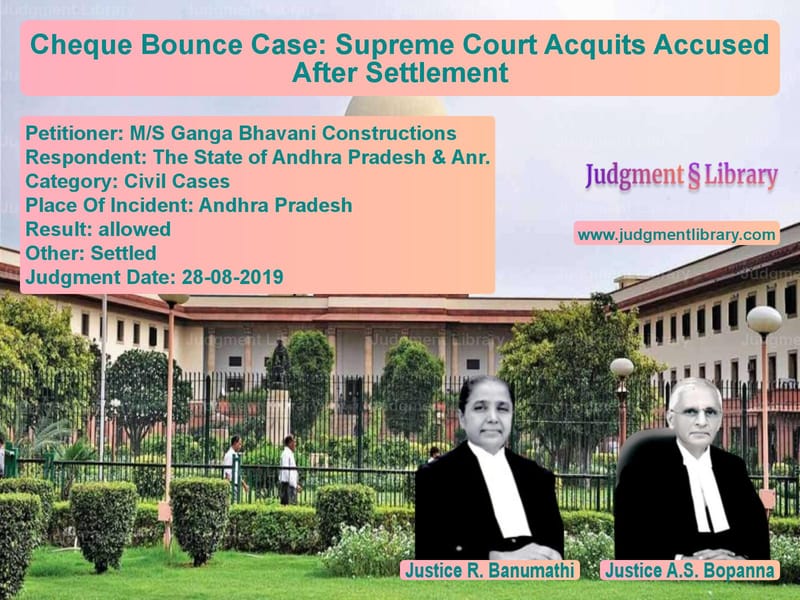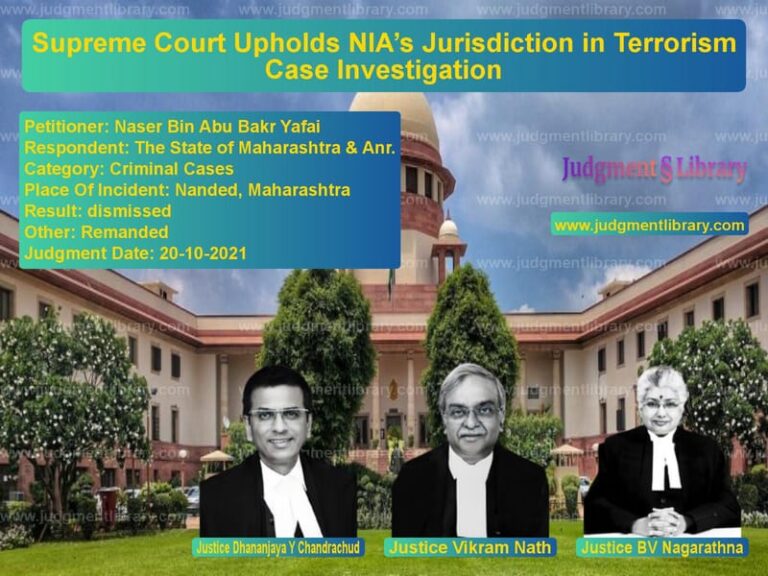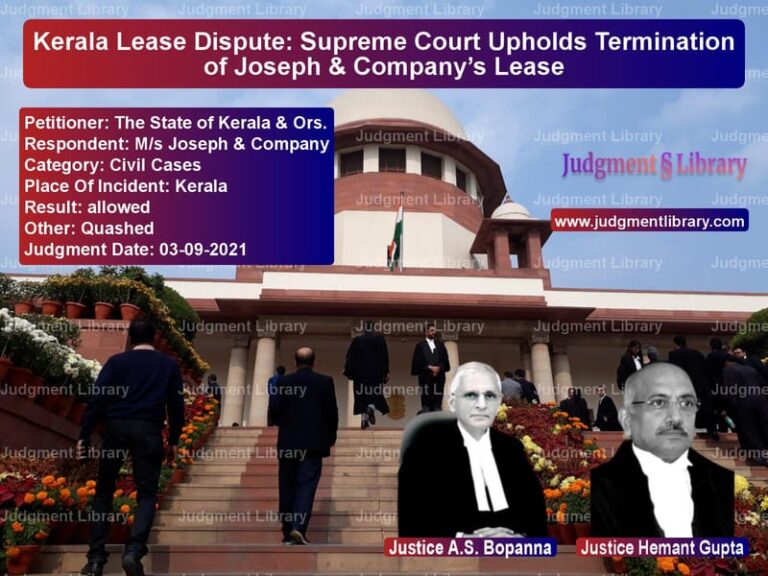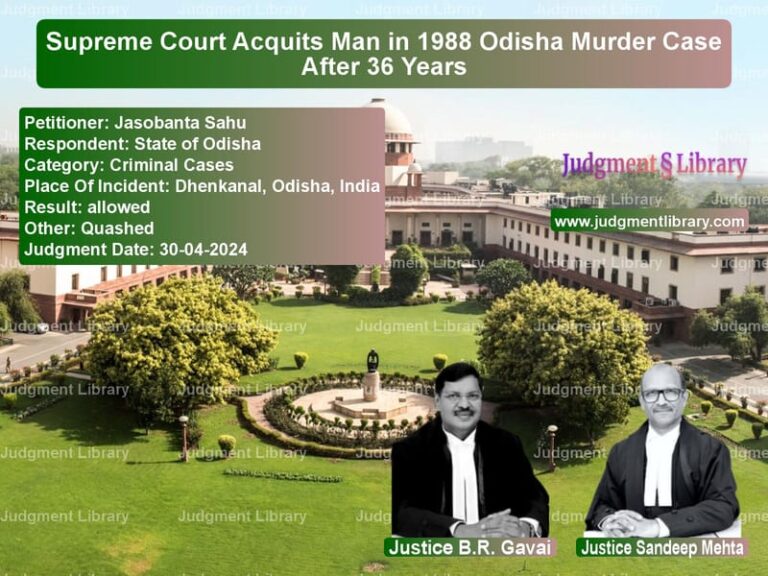Cheque Bounce Case: Supreme Court Acquits Accused After Settlement
The case of M/S Ganga Bhavani Constructions vs. The State of Andhra Pradesh & Anr. revolves around a cheque bounce dispute under Section 138 of the Negotiable Instruments Act, 1881 (N.I. Act). The Supreme Court’s ruling in this case underscores the importance of compromise settlements in criminal proceedings and the legal framework for quashing convictions in cheque dishonor cases.
The main legal issue was whether an accused convicted under Section 138 of the N.I. Act can be acquitted after reaching a settlement with the complainant.
Background of the Case
The appellant, M/S Ganga Bhavani Constructions, represented by its proprietor Sri Reddy Satyanarayana @ Satish, had borrowed a sum of Rs. 10,00,000 from the complainant, Narapureddy Sanyasi Rao, on April 4, 2007. As security for repayment, the appellant executed a promissory note in favor of the complainant and issued a cheque dated April 17, 2008.
When the cheque was presented for payment, it was returned by the bank with the endorsement “payment stopped by drawer” on April 18, 2008. Following this, the complainant filed a case under Section 138 of the Negotiable Instruments Act, which deals with the dishonor of cheques due to insufficient funds or other reasons.
Lower Court’s Decision
The Trial Court, in its judgment dated April 17, 2012, convicted the appellant under Section 138 of the N.I. Act and sentenced him to two years of simple imprisonment. The conviction was based on the following grounds:
- The accused admitted his signature on the cheque.
- The accused failed to rebut the presumption under Section 138 of the N.I. Act, which states that once a cheque is issued, it is presumed to be for the discharge of a legally enforceable debt.
- The accused did not present any valid reason for stopping payment of the cheque.
High Court’s Decision
The appellant filed an appeal before the First Appellate Court, which upheld the conviction and sentence of two years imprisonment. Subsequently, a Criminal Revision Petition was filed before the High Court of Andhra Pradesh. The High Court, in its judgment dated October 11, 2018, upheld the conviction but reduced the sentence from two years to one year.
Supreme Court’s Observations
The appellant approached the Supreme Court, arguing that he had reached a compromise settlement with the complainant and should be acquitted in terms of Section 320(8) of the Code of Criminal Procedure (Cr.P.C.).
The Supreme Court made the following key observations:
- On January 2, 2019, the Court had directed the appellant to deposit Rs. 5,00,000 before the Trial Court (VIth Additional Judicial Magistrate of First Class, Rajahmundry).
- The appellant complied with the order and deposited the amount on February 15, 2019.
- Both parties appeared in person before the Supreme Court on August 28, 2019, and presented a Compromise Memo, duly attested by a Notary Public.
- The complainant, Narapureddy Sanyasi Rao, confirmed receiving Rs. 10,00,000 as full and final settlement.
- Since the dispute was settled amicably, the Court exercised its powers under Section 320(8) of Cr.P.C. to quash the conviction.
Key Ruling and Verdict
The Supreme Court ruled that:
- The conviction of the appellant under Section 138 of the N.I. Act was set aside.
- The appellant was acquitted of all charges.
- The Rs. 5,00,000 deposited before the Trial Court was ordered to be refunded to the appellant.
The Court held:
“In view of the compromise arrived at between the parties, the conviction of the appellant-accused under Section 138 of the N.I. Act and the sentence imposed upon him is set aside, and the appellant-Sri Reddy Satyanarayana @ Satish is acquitted of the charge under Section 138 of the N.I. Act in terms of Section 320(8) of the Cr.P.C.”
Implications of the Judgment
This judgment has significant implications for cheque bounce cases and criminal proceedings:
- Importance of Compromise in Cheque Bounce Cases: If both parties reach a settlement, courts can quash convictions to avoid unnecessary litigation.
- Presumption under Section 138: The accused must provide strong evidence to rebut the presumption that a cheque was issued for a legally enforceable debt.
- Refund of Deposited Amount: If a settlement is reached after conviction, any amount deposited with the court may be refunded to the accused.
- Encouragement for Out-of-Court Settlements: The ruling highlights that courts favor amicable resolutions over prolonged criminal litigation.
The Supreme Court’s ruling reinforces the principle that courts should encourage settlement in financial disputes, ensuring that both parties receive a fair resolution.
Petitioner Name: M/S Ganga Bhavani Constructions.Respondent Name: The State of Andhra Pradesh & Anr..Judgment By: Justice R. Banumathi, Justice A.S. Bopanna.Place Of Incident: Andhra Pradesh.Judgment Date: 28-08-2019.
Don’t miss out on the full details! Download the complete judgment in PDF format below and gain valuable insights instantly!
Download Judgment: MS Ganga Bhavani Co vs The State of Andhra Supreme Court of India Judgment Dated 28-08-2019.pdf
Direct Downlaod Judgment: Direct downlaod this Judgment
See all petitions in Cheque Dishonour Cases
See all petitions in Contract Disputes
See all petitions in Damages and Compensation
See all petitions in Judgment by R. Banumathi
See all petitions in Judgment by A. S. Bopanna
See all petitions in allowed
See all petitions in settled
See all petitions in supreme court of India judgments August 2019
See all petitions in 2019 judgments
See all posts in Civil Cases Category
See all allowed petitions in Civil Cases Category
See all Dismissed petitions in Civil Cases Category
See all partially allowed petitions in Civil Cases Category







